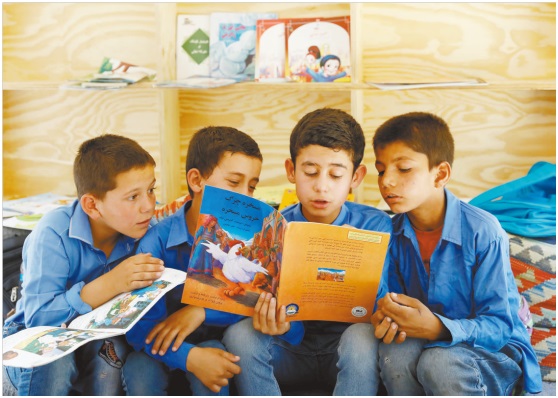By Liu Jian
For 40 years, the Afghan issue has attracted much attention as an international hotspot issue. The endless conflicts and wars have brought profound disaster to the Afghan people, hindered the country’s construction, and severely affected regional peace and stability. Is the country unable to walk out of turmoil and get rid of the miserable fate? People can’t help but ask.
Human history has repeatedly proved that resorting to force and violence can easily lead to a vicious cycle in which revenge breeds revenge and the people are plunged into an abyss of misery. To resolve disputes through dialogue and seek long-term stability through negotiation is the right way out.
After a year and a half of talks, the U.S. signed a historic peace agreement with Afghanistan’s Taliban at the end of February this year that includes withdrawal of foreign troops from Afghanistan, Taliban reduction of violence, counter-terrorism and the start of the intra-Afghan negotiations.
China welcomes the signing of the agreement as a positive step in achieving a political solution of the Afghan issue, and hopes that all important agendas can be steadily advanced to make the deal a window of opportunity for a peaceful reconciliation process.
Peace, like air and sunshine, is hardly noticed when people are benefiting from it, but none of us can live without it.
To stop violence and restore peace is the greatest aspiration of more than 30 million Afghan people and the common expectation of regional countries and the international community.
The Afghan issue has a long history and is complex and sensitive. Achieving peace requires the concerted cooperation and unremitting efforts of all circles in Afghanistan and the international community.
China has played a constructive role in advancing the reconciliation process in Afghanistan over the years, by upholding the vision of building a community with a shared future for mankind and following the “Afghan-led and Afghan-owned” principle and on the basis of fully respecting the sovereignty of Afghanistan and the will of all parties in the country.
The country has worked as a mediator and convenience provider of the Afghan peace and reconciliation process. Its constructive and important role has been welcomed and praised by all parties concerned.
China has promoted establishment of the China-Afghanistan-Pakistan Trilateral Foreign Ministers’ Dialogue, the China-Russia-U.S. trilateral consultation on the Afghan peace process, and the SCO-Afghanistan Contact Group. It has built a platform and created conditions for the advancement of peace reconciliation in Afghanistan, contributing Chinese wisdom and solutions.
China also takes an active part in multilateral mechanisms and meetings such as the Kabul Process, the Moscow Talks, the Istanbul Process and the Quadrilateral Coordination Group (QCG made up of Afghanistan, Pakistan, China and the U.S.), advocating peace and maximizing common interests. Its efforts have won the respect and trust of all parties.
After the U.S.-Taliban deal was inked, China continues to play a constructive role, urging all parties in Afghanistan to focus on the interests of the country and the people, seize opportunities, demonstrate responsibility and courage, and jointly work toward the political arrangements and security framework that are accepted by all parties.
At the same time, the country calls on foreign troops stationed in Afghanistan to withdraw in an orderly and responsible manner, increase investment in the peaceful reconstruction of Afghanistan, and crack down on terrorist forces.
Peace cannot sustain without secure livelihoods. Development is the key to solving all problems. Economic and social development is essential for sustainable peace in Afghanistan. Only by returning to normal work and life as soon as possible and letting more people have schools to go and become employed and medically secure can the country eliminate the root causes for violence and turmoil.
Since Afghanistan started the peace and national reconciliation process in 2001, China has provided assistance within its ability in economic development and capacity building for Afghanistan based on the latter’s needs.
The country offers thousands of training opportunities and more than one hundred Chinese government scholarships to Afghanistan every year. It has built schools, hospitals and other infrastructure and livelihood projects for Afghanistan and expanded transportation corridors and opened the domestic market for Afghan specialty products such as pine nuts, saffron and carpets.
Under the framework of the Belt and Road Initiative, China has promoted the interconnection between Afghanistan and countries in the region, helped Afghanistan take advantage of its location and enhance its capacity for independent development.
Recently, the Chinese government and all sectors of society have strongly supported Afghanistan’s fight against the novel coronavirus pneumonia epidemic by actively offering material assistance, sending Chinese people’s deep friendship to Afghan people.
The road to peace is hard and bumpy. However, no matter how far the destination is, we will get there as long as we have perseverance. China will continue to play a constructive role and make important contributions in the process of peace and reconciliation in Afghanistan. This is the common expectation of the people of China and Afghanistan and the due meaning of the diplomacy of a big country with Chinese characteristics in the new era.
It is hoped that with the strong support of the international community, all parties in Afghanistan will work together to build a foundation for peace, discuss development plans, and pave the way to prosperity. I hope that people in the war-torn country could usher in a beautiful, peaceful and happy tomorrow at an early date.
(Liu Jian the Special Envoy for Afghanistan of China’s Ministry of Foreign Affairs.)
Afghan students read books at a mobile library in Kabul, capital of Afghanistan, July 2, 2019. File photo












Leave a Comment